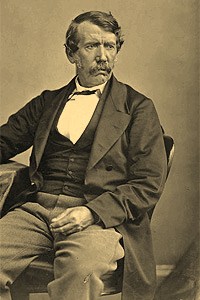
Traveling to Africa, Livingstone set out to take the word of God to the “…thousand villages where no missionary has ever been" of which Moffat had told him. It was while helping the people of one of those villages to hunt and shoot a marauding lion that Livingstone was mauled and received injuries that troubled him for the rest of his life. While recovering from his wounds, Livingstone met and married Moffat's oldest daughter, Mary, who joined him in his work till she died of malaria in 1862. When he was able, Livingstone pushed further and further into the African heartland, preaching, teaching, and helping the sick. When he moved from one village to the next, many of the inhabitants would follow – not wishing to be separated from him.
Many of the people he influenced for Christianity were short-lived in their faith, but Sechele, chief of the Kwena people of Botswana, became a staunch follower (except in certain areas such as polygamy). After learning to read, then teaching his wives the skill, Sechele wrote down the Bible in his own language as well as converting most of his people and leading missionaries to surrounding tribes. Certainly many people heard the gospel either directly or indirectly through Livingstone. Livingstone’s accomplishments as an explorer in Africa were also many. He did the “impossible” in crossing the Kalahari Desert, developed a provisional cure for malaria, discovered numerous rivers and large lakes and was also the first European to discover Victoria Falls, the largest waterfall on earth.
Livingstone believed that “Christianity, commerce and civilization” would wipe out the slave trade in Africa, and so he returned to England to gain official support for his idea to open up the Zambezi River as a highway that would carry all three of his goals into the interior. Unfortunately, the expedition ultimately failed as the river was found unnavigable in areas. Livingstone was also criticized by expedition members and had to seek private funding to continue his work in Africa. Returning there, he lost contact with the outside world for six years and was finally found by the American reporter Henry Morton Stanley. It was on this occasion that Stanley is said to have uttered the now famous words “Dr. Livingstone, I presume?”- ironic in that Livingstone was the only other white man in hundreds of miles.
Livingstone’s final years were spent in poor health and often in severe sickness. In 1871 he witnessed some 400 people massacred by slavers, and this event destroyed his desire to continue exploration, though he continued his Christian and medical work. Finally, after exploring and serving as a missionary in Africa for 22 years, he died in 1873 while still working with the people he strove to serve. A figure of legendary proportions in Britain, he was honored with burial in Westminster Abbey in London.
Like all of us, Livingstone had his shortcomings, but he endured incredible things in the course of his missionary activity and greatly served the people among whom he worked. The accomplishments of his faith were many. Most importantly, after he died, the life of David Livingstone became an inspiration to countless other missionaries who have followed after him, both in Africa and elsewhere.
 RSS Feed
RSS Feed
